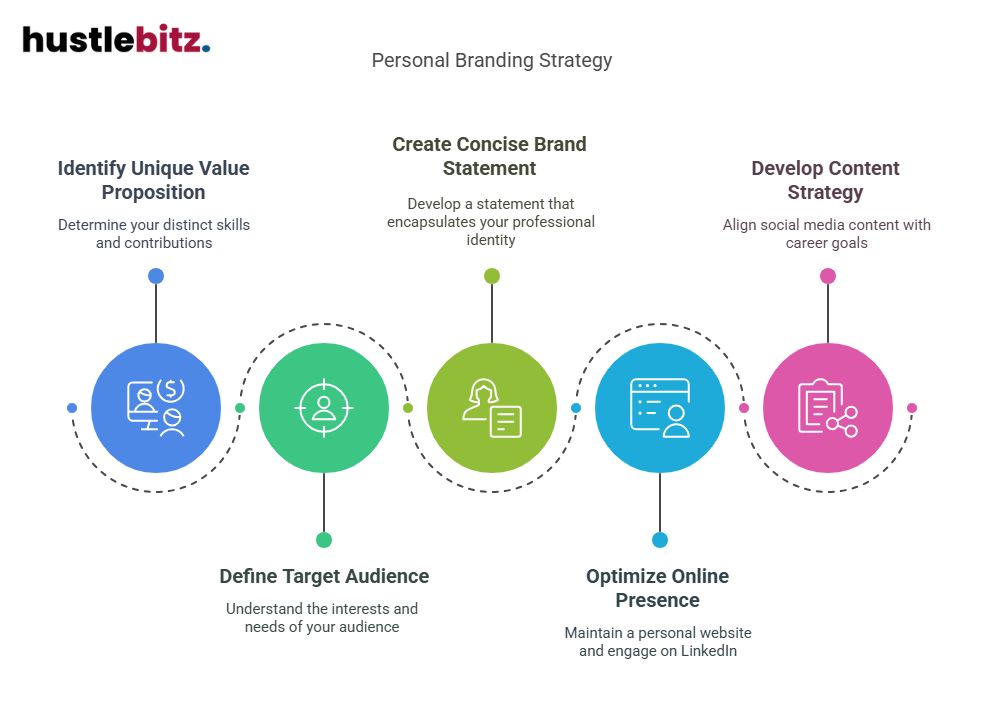Building a personal brand is crucial for career success in a competitive job market. Start by understanding your unique value and defining what sets you apart. Clearly articulate this in a brand statement that resonates with your target audience. Optimize your online presence through a personal website and active engagement on social media, ensuring consistent messaging and visual identity. Share valuable content to establish authority and build trust. Regularly evaluate your strategies and audience feedback to remain relevant. Cultivating a strong personal brand takes time and effort, and there are additional steps to explore that can further enhance your impact.
Key Takeaways
- Identify and articulate your unique value proposition to highlight your distinct skills and contributions in your professional field.
- Define your target audience to tailor your personal branding messages effectively based on their interests and needs.
- Create a concise brand statement that encapsulates your professional identity and resonates with your audience.
- Optimize your online presence by maintaining a personal website and engaging on professional networking platforms like LinkedIn.
- Develop a content strategy for social media that aligns with your career goals and fosters meaningful engagement with your audience.

Understand Personal Branding
Understanding personal branding is essential for professionals seeking to differentiate themselves in a competitive job market, as it encompasses the unique qualities and values that define an individual’s professional identity.
Personal branding is not merely about self-promotion; it involves effectively communicating one’s strengths, skills, and experiences to shape brand perception. This perception influences how others view and interact with a professional, making it a critical aspect of career growth.
At the heart of personal branding lies reputation management. Professionals must actively curate their online and offline presence, ensuring consistency in messaging and behavior. This consistency fosters trust and credibility, which are paramount in establishing a solid professional identity.
Authenticity matters significantly—individuals should strive to present a genuine version of themselves, as this authenticity resonates with audiences and differentiates them from competitors.
Storytelling techniques play a pivotal role in personal branding, allowing professionals to engage their audience on a deeper level. By sharing personal experiences and insights, individuals can create relatable narratives that highlight their unique value propositions.
This approach not only humanizes the professional but also reinforces their brand identity in the minds of others.
Identify Your Unique Value

Identifying your unique value is crucial for establishing a compelling personal brand that resonates with potential employers and clients. Your unique value encapsulates the unique skills and personal strengths that distinguish you from others in your field. To effectively communicate this value, it is essential to articulate your value proposition clearly, highlighting what you bring to the table that cannot be easily replicated.
Begin by reflecting on your past experiences and evaluating your differentiating factors. Consider what specific accomplishments or challenges have contributed to your professional journey. These insights can reveal patterns in your strengths, whether they are analytical thinking, creative problem-solving, or exceptional interpersonal skills. By pinpointing these attributes, you can construct a narrative that conveys your authentic identity.
Moreover, seeking feedback from peers, mentors, or supervisors can unveil aspects of your unique value that you may not recognize in yourself. Engaging in this reflective process allows you to refine your understanding of your unique skills and how they contribute to your overall professional brand.
In a competitive job market, clearly defining your unique value not only enhances your personal brand but also empowers you to make informed career choices. By embracing your authentic identity and communicating your unique value proposition effectively, you position yourself as a desirable candidate who stands out amidst the crowd. This self-awareness ultimately strengthens your ability to connect with potential employers and clients, paving the way for career success.
Define Your Target Audience

Defining your target audience is essential for tailoring your personal brand message to resonate effectively with the specific individuals or organizations you aim to engage.
To achieve this, a strategic approach involving audience research, demographic analysis, and niche identification is crucial. Understanding these elements allows you to create more effective engagement strategies that will enhance your brand’s visibility and impact.
Here are three key steps to help you define your target audience:
- Conduct Audience Research: Begin by gathering data about your potential audience. This can include their interests, preferences, and pain points. Use surveys, social media analytics, and industry reports to collect relevant information.
- Perform Demographic Analysis: Analyze the demographics of your audience, such as age, gender, education, and location. This information will help you tailor your messaging and ensure it resonates with the right people.
- Identify Your Niche: Focus on a specific segment within your broader audience. By identifying your niche, you can position yourself as an expert in that area, which can lead to stronger connections and more meaningful engagement.
Incorporating feedback mechanisms, such as soliciting opinions and suggestions from your audience, will further refine your understanding and allow you to adapt your strategies accordingly.
Craft Your Brand Statement
A compelling brand statement succinctly communicates your unique value proposition and the essence of your personal brand, serving as a foundational element for your career success. This statement should reflect your brand authenticity, allowing you to connect with your audience genuinely.
To craft an effective brand statement, consider employing storytelling techniques that convey your professional journey, values, and aspirations.
Begin by identifying the core elements that define your professional identity. What skills, experiences, and passions set you apart? Consolidate these attributes into a concise narrative that captures your essence. This narrative will not only serve as your elevator pitch during networking opportunities but also reinforce your visual identity across all platforms, ensuring brand consistency.
As you refine your brand statement, aim for clarity and impact. It should be easily understandable and resonate with your target audience. Utilize language that reflects your personality while remaining professional.
The final product should be a brief, engaging summary that encapsulates who you are and what you offer, making it memorable and actionable.
Optimize Your Online Presence

Optimizing your online presence is essential for building a personal brand that resonates with your target audience and enhances your career opportunities. In today’s digital age, your online reputation and digital footprint play pivotal roles in how you are perceived by potential employers and professional networks.
To effectively optimize your online presence, consider the following strategies:
- Create a Personal Website: A personal website serves as a central hub for your brand. It showcases your resume, portfolio, and accomplishments, allowing you to control the narrative of your professional story. Ensure that your website reflects branding consistency with your social media profiles and other online content.
- Monitor Your Online Reputation: Regularly search for your name online to see what information is available about you. This practice helps you identify any negative content and take steps to mitigate its impact. Be proactive in managing your digital footprint by promoting positive content that highlights your skills and achievements.
- Engage in Professional Networking: Utilize platforms like LinkedIn to connect with industry professionals. Share relevant articles, contribute to discussions, and engage with your connections to enhance your visibility and credibility within your field. Building a robust professional network will amplify your online presence and open doors for career opportunities.
Leverage Social Media Effectively

Utilizing social media platforms strategically can significantly enhance your personal brand and expand your professional network. To effectively leverage these platforms, it is essential to develop a clear content strategy that aligns with your professional goals. This involves determining the types of content that resonate with your target audience, thereby facilitating meaningful audience engagement.
Branding consistency is crucial when presenting your personal brand across various social platforms. Ensure that your messaging, tone, and visual identity remain uniform, as this fosters recognition and trust among your audience. For instance, using a cohesive color scheme, logo, and style of imagery can strengthen your brand’s visual identity and make it more memorable.
Engagement on social media is not merely about posting updates; it also entails interacting with your audience. Responding to comments, participating in discussions, and sharing insights can create a sense of community and encourage followers to engage with your content more actively. This two-way communication enhances your credibility and positions you as an authority in your field.
Furthermore, regularly evaluating your social media presence can help you refine your approach. Assess which types of posts garner the most engagement and adapt your content strategy accordingly. By monitoring trends and audience feedback, you can ensure that your personal brand remains relevant and appealing.
Share Valuable Content

Sharing valuable content is essential for establishing authority in your field and attracting a dedicated audience. By consistently providing high-quality information, you enhance your brand authenticity and foster audience engagement.
Here are three strategies to effectively share valuable content:
- Content Curation: Gather and share relevant information from various sources within your industry. Curating content not only positions you as a knowledgeable resource but also demonstrates your commitment to staying informed. Always credit original creators to maintain integrity.
- Utilize Storytelling Techniques: People connect with stories. Use storytelling techniques to present your insights in a relatable manner. By weaving personal experiences or case studies into your content, you make complex information more accessible and engaging, which helps to anchor your audience’s interest.
- Maintain Content Consistency: Regularly sharing valuable content builds trust and expectation with your audience. Develop a content calendar to ensure consistent delivery across platforms. This not only showcases your expertise but also creates opportunities for deeper connections with your followers.
Final Thoughts
Building a personal brand is essential for achieving career success in today’s competitive landscape. By identifying your unique value, defining your target audience, and creating a compelling brand statement, you can effectively communicate your professional identity. Optimizing your online presence and leveraging social media strategically will enhance your visibility and authority within your field. Sharing valuable content not only establishes your expertise but also fosters meaningful connections with your audience. Embracing these steps will empower you to cultivate a strong personal brand that not only supports your career aspirations but also contributes to your professional growth and success in an ever-evolving job market. Prioritizing personal branding is an investment in your future, ensuring you stand out and thrive in your chosen career path.




